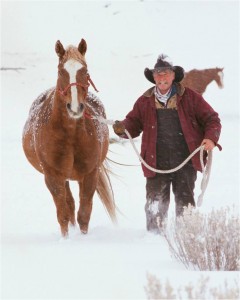
With winter right around the corner, we’d like to offer a few horse care tips that can help you during the cold weather. Whether your winter consists of cooler temps and occasional light rains, or months of biting cold winds with snow and ice, here are some easy steps you can take to help make the winter a little more manageable.
Blanketing
Unless your horse stays in work or competes during the winter, it is best to let the coat grow out naturally during winter. For horses with a full winter coat, blanketing is usually not necessary and in fact, blankets can to compress the wooly coat’s layers, compromising their insulating properties. If you are planning to blanket your horse this winter, check the blankets in advance to make sure they are clean and are free of tears or holes. Also inspect the clasps to make sure they are in good, working condition. Try the blanket on your horse to make sure it still fits well, which will help prevent future rubbing and hair loss during wear. The blankets should be taken off every few days and cleaned to limit fungus growth. Ideally, you will have more than one blanket so they can be rotated if one gets dirty or wet.

Shelter
Most people provide a shelter of some sort for their horses to help protect them from the winter snow, wind, and rain. If you have a barn or run-in shed, the floors should be raised so that horses have a dry spot to stand. Check around to see that the horse’s quarters are clean and well ventilated; also, look around for anything that might injure or tempt the horse, such as loose boards, loose nails, ropes, etc.
Assess Body Condition
As temperatures start to drop, it’s important to evaluate your horse’s body condition to determine if he’s too fat, too thin, or just right. A healthy layer of fat over your horse’s ribs both insulates and provides extra energy to help keep him warm during the cold winter months. Ideally, try to improve your horse’s body condition before mid-winter when you first realize he’s a little thin, especially in the case of senior horses.
Adjust Feed
Since horses need extra feed during the winter in order to help them maintain their body temperature, you might need to adjust your horse’s feed portions during this time so he can maintain adequate body condition. Feeding good-quality hay at 1-2.5% of your horse’s weight daily is key to sustaining a horse through winter, so if you can try stocking up on good quality hay early, particularly in areas affected earlier in the year by drought. Also, you can routinely evaluate his condition by feeling over his ribs and if he needs extra feed, be sure to make the changes slowly to avoid gastrointestinal problems such as colic.
Water
Water intake is especially important in winter to maintain proper hydration and avoid impaction colic. If you use an unheated water source such as an automatic waterer, check for any ice a few times a day, and make sure the water is fresh and clean. If you use a heated water tank, make sure they’re in working order, well grounded, and that electrical wires are protected with chew-proof material such as PVC pipe. Also, providing free-choice trace mineralized salt can also encourage your horse to drink throughout winter.
Hoof Care
Winter months can pose several challenges to maintain good, healthy hooves. Muddy pastures can lead to problems for horses’ hooves, such as thrush or weak soft hooves; cold winter air can quickly dry out the hoof wall; and snow can ball up under the sole and cause bruising. The best prevention is to provide a dry area for your horse and clean his hooves daily to remove mud or snow. All year round, the best prevention is to keep your horse on Hoof ReNu which contains 50 mg of biotin. For horses of all ages, it’s important to help keep their hooves healthy and strong, especially during the cold winter months.
Equine Joint Care
You’ve probably noticed that in colder weather, your joints may hurt a little bit and you may experience some stiffness. Most likely, your horse is feeling the same thing! The best way to manage joint care in your horse during the winter is to keep him as active as possible and give him InflamAway HA-200 Advanced Joint Support Formula with 200 mg. hyaluronic acid. For horses that need advanced joint support, such as horses in competition or older horses, InflamAway HA-200 is your #1 choice.
So keeping your horse warm, healthy, and happy during the winter can be challenging, especially if you live in a climate with extremely cold weather. From blanket maintenance to adjusting feed to assessing body condition, hopefully these tips will help you prepare your horse for winter.

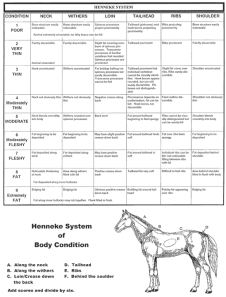
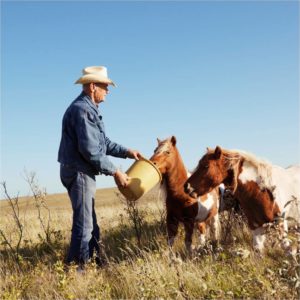
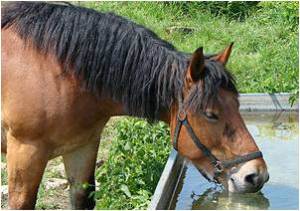
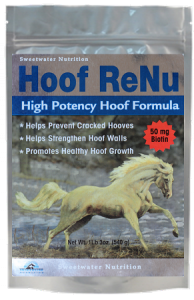
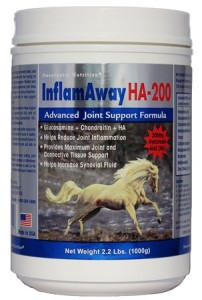




Leave a Reply